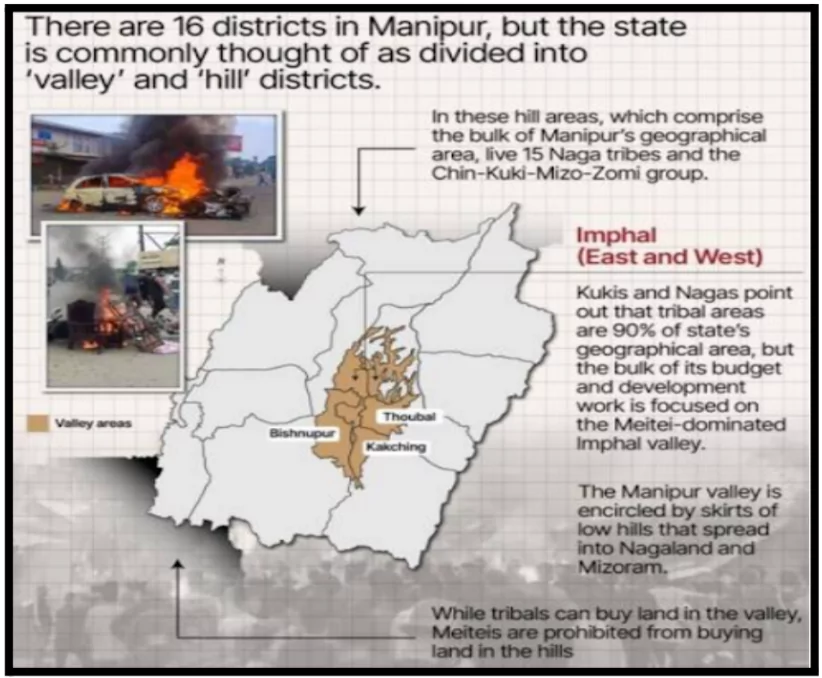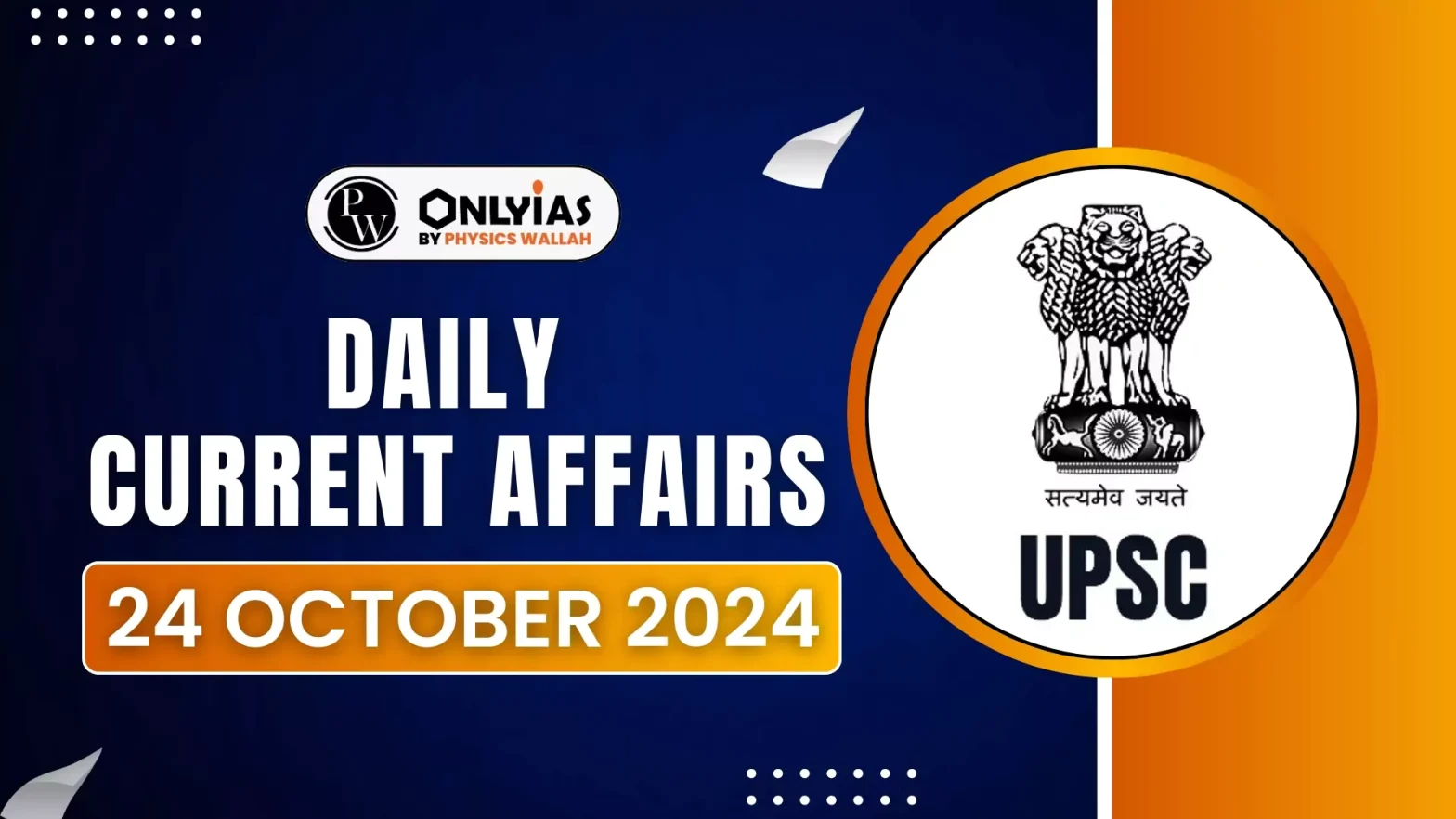The ongoing ethnic conflict in Manipur between the Meiteis and Kukis, which began on May 3, 2023, poses a significant challenge for All India Services (AIS) officers.
About Ethnic Conflict
- Ethnic conflict refers to disputes or hostilities between different ethnic groups, often due to competition for resources, political power, cultural recognition, or historical grievances.
- These conflicts can manifest as violence, discrimination, displacement, social unrest etc.
Enroll now for UPSC Online Course
Causes of Ethnic Conflicts
- Historical Grievances: Long-standing resentments and past injustices create deep-seated animosities.
- Competition for Resources like land, water etc: Example: Conflicts in Darfur, Sudan, where competition over land and water resources between Arab and non-Arab groups has led to violence and displacement.
- Political Power Struggles: Disputes over representation and autonomy exacerbate tensions in multi-ethnic societies.
- Example: The South Sudan Civil War, where power struggles exists between the Dinka and Nuer ethnic groups.
- Cultural Differences: Divergent languages and customs foster misunderstandings and prejudice.
- Example: Israeli-Palestinian conflict.
- Economic Factors: Example: The Kurdish conflict in Turkey, where economic marginalisation of Kurdish regions has fueled resentment and demands for greater autonomy.
Background Of Ethnic Conflict in Manipur, Conflict Between Meiteis and Kukis
- Geographical Divisions: Manipur, located in India’s Northeast, is home to various tribal groups, including the Meitei, Nagas, and Chin-Kuki-Mizo tribes.
- The Meiteis, mostly Hindus, live in the Imphal valley.
- The Kukis, primarily Christians, mostly inhabit the hills.
- They have disputes over conflicting homeland demands and religious differences.
- Triggering Events
- Protests for Tribal Status: Tensions escalated when Kukis protested against Meitei demands for official tribal status, fearing it would enhance Meitei influence in government and society.
 Illegal Migration: and concerns of demographic changes as well as marginalisation of the Meitei community has intensified tensions between communities.
Illegal Migration: and concerns of demographic changes as well as marginalisation of the Meitei community has intensified tensions between communities.
- Example: The higher decadal growth rate of the population in the hills compared to the valley in the 2011 Census has raised suspicions that people are illegally migrating from neighbouring countries like Myanmar, Nepal, and Bangladesh.
- Drug Issue: Manipur shares a border with conflict-ridden Myanmar, which is infamous for poppy cultivation and drug trafficking.
- Poppy grown in Manipur’s hill areas feeds the drug trade and is an important source of livelihood for tribal groups living there.
- The state government’s war on drugs has evoked resentment among the Kukis, who see it as a ploy to deprive them of their livelihood.
- Fatalities: At least 130 people have been killed and 400 wounded in violence that began in May.
- More than 60,000 have been forced from their homes as the army, paramilitary forces and police struggle to quell violence.
Ethical Dimensions Involved For the Administrative Officers in Conflict Zones
- Public Service Obligation: IAS officers must prioritise the welfare of the community, which entails working towards peace and stability while ensuring that their actions do not exacerbate existing tensions.
- The conflict has created deep fault lines within the state’s administration, fragmented along the ethnicity of the officers, especially those from All India Services.
- Impersonality and Integrity: Maintaining impartiality is crucial.
- As per Max Weber Bureaucratic Theory: Bureaucracy should be characterised by impersonality, where decisions are made based on objective criteria rather than personal relationships or preferences.
- In this Situation, Officers posted in Manipur must manage their personal identities while ensuring that they do not let ethnic affiliations cloud their judgement or professional responsibilities.
- Mental Health and Well-being: Officers are isolated in administrative cocoons, with geographical barriers and a pervasive fear dampening their willingness to take field postings.
- This can lead to burnout and moral distress.
- Ethical leadership necessitates recognizing these challenges and seeking support for oneself and fellow officers.
- Collaboration and Unity: Fostering a spirit of collaboration among officers from different ethnic backgrounds is vital for effective governance.
- Accountability and Transparency: Officers must be accountable for their actions, ensuring that decisions are made transparently and ethically, particularly in a context filled with hate speech, misinformation and propaganda.
- As per Carl Friedrich’s Administrative Responsibility: Public administrators are accountable to the public they serve.
- Cultural Sensitivity: Recognising the cultural dimensions of conflict and respecting the values and traditions of all parties involved is also a vital dimension.
Check Out UPSC NCERT Textbooks From PW Store
Challenges for IAS Officers In Managing Administration In Conflict Zones
- Safety Concerns: The physical safety of officers has become a significant issue, limiting their ability to engage with communities and conduct fieldwork, which is essential for effective governance.
- Example: There are reports of government officials having been killed by mobs.
- Isolation and Fragmentation: Officers are increasingly confined to “safe districts,” leading to a lack of exposure to the realities on the ground.
- This isolation can hinder their ability to respond effectively to the needs of the people.
- Erosion of Relationships: The atmosphere of distrust and hostility can erode ‘esprit de corps’ (unity and mutual respect among officers) among officers, making collaboration and teamwork difficult.
- Administrative Barriers: Open access between hill and valley districts for All India Services (AIS) officers has been restricted due to the establishment of “buffer zones.
- These buffer zones create physical and administrative barriers, which contradict the principles of federalism.
- Inadequate Training for Conflict Situations: Current training programs may not adequately prepare officers for the unique challenges posed by working in a conflict environment, necessitating a reevaluation of training curricula.
Way Forward
- Enhanced Training Modules: Developing specialised training on conflict management and reconciliation should be a priority for institutes like Lal Bahadur Shastri National Academy of Administration (LBSNAA) and the Indian Institute of Public Administration (IIPA)
- Example: Incorporating real-life case studies from Manipur can help in better management of ethnocentric politics and conflicts.
- Regular Communication Channels: Establish clear communication channels and implement virtual meetings among officers from different ethnic backgrounds to facilitate dialogue, promote unity, and combat misinformation during crises.
- Support Systems for Officers: Establishing mental health support and peer counselling can help officers cope with the stresses of working in conflict zones, ensuring their well-being and effectiveness.
- There is a need for fostering a culture of continuous collaboration among officers from diverse backgrounds to reinforce a unified front in conflict management.
- Community Engagement Initiatives: Officers should actively engage with local communities through outreach programs, promoting trust and understanding while working towards conflict resolution.
- There is a need to promote dialogue, peacebuilding, and reconciliation between the communities involved.
- Formation of High Level Committee: Forming a committee to look into the genuine development issues raised by different communities could be a positive step toward addressing the grievances and concerns of the affected communities.
Enroll now for UPSC Online Classes
Conclusion
The ethnic violence in Manipur exposes weaknesses in India’s administrative system for handling communal conflicts, posing challenges to the All India Services while offering a chance to reform governance in conflict prone areas.
![]() 24 Oct 2024
24 Oct 2024

 Illegal Migration: and concerns of demographic changes as well as marginalisation of the Meitei community has intensified tensions between communities.
Illegal Migration: and concerns of demographic changes as well as marginalisation of the Meitei community has intensified tensions between communities.
